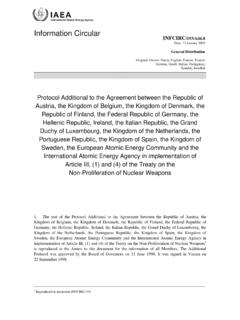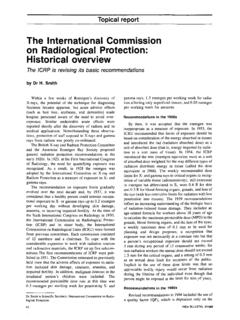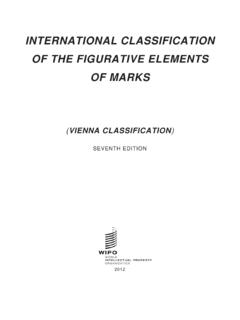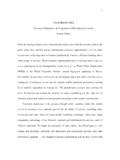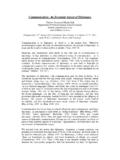Transcription of INFORMATION CIRCULAR ARABIC, CHINESE ENGLISH, …
1 INFINFCIRC/54624 December 1997 International Atomic Energy AgencyGENERAL CIRCULARO riginal: arabic , CHINESE english , french , russian and SPANISH JOINT convention ON THE SAFETY OF SPENT FUEL MANAGEMENTAND ON THE SAFETY OF RADIOACTIVE WASTE Joint convention on the Safety of Spent Fuel Management and on the Safety ofRadioactive Waste Management was adopted on 5 September 1997 by a Diplomatic Conferenceconvened by the International Atomic Energy Agency at its headquarters from 1 to 5 September1997.
2 The Joint convention was opened for signature at Vienna on 29 September 1997 during theforty-first session of the General Conference of the International Atomic Energy Agency and willremain open for signature until its entry into to article 40, the Joint convention will enter into force on the ninetieth day after thedate of deposit with the Depositary of the twenty-fifth instrument of ratification, acceptance orapproval, including the instruments of fifteen States each having an operational nuclear power text of the convention , as adopted, is attached hereto for the INFORMATION of CONVENTIONON THE SAFETY OF SPENT FUEL MANAGEMENT ANDON THE SAFETY OF RADIOACTIVE WASTE MANAGEMENTJOINT CONVENTIONON THE SAFETY OF SPENT FUEL MANAGEMENT ANDON THE SAFETY OF RADIOACTIVE WASTE MANAGEMENTPREAMBLECHAPTER 1 OBJECTIVES.
3 DEFINITIONS AND SCOPE OF APPLICATIONARTICLE 1 OBJECTIVESARTICLE 2 DEFINITIONSARTICLE 3 SCOPE OF APPLICATIONCHAPTER 2 SAFETY OF SPENT FUEL MANAGEMENTARTICLE 4 GENERAL SAFETY REQUIREMENTSARTICLE 5 EXISTING FACILITIESARTICLE 6 SITING OF PROPOSED FACILITIESARTICLE 7 DESIGN AND CONSTRUCTION OF FACILITIESARTICLE 8 ASSESSMENT OF SAFETY OF FACILITIESARTICLE 9 OPERATION OF FACILITIESARTICLE 10 DISPOSAL OF SPENT FUELCHAPTER 3 SAFETY OF RADIOACTIVE WASTE MANAGEMENTARTICLE 11 GENERAL SAFETY REQUIREMENTSARTICLE 12 EXISTING FACILITIES AND PAST PRACTICESARTICLE 13 SITING OF PROPOSED FACILITIESARTICLE 14 DESIGN AND CONSTRUCTION OF FACILITIESARTICLE 15 ASSESSMENT OF SAFETY OF FACILITIESARTICLE 16 OPERATION OF FACILITIESARTICLE 17 INSTITUTIONAL MEASURES AFTER CLOSURECHAPTER 4 GENERAL SAFETY PROVISIONSARTICLE 18 IMPLEMENTING MEASURESARTICLE 19 LEGISLATIVE AND REGULATORY FRAMEWORKARTICLE 20 REGULATORY BODYARTICLE 21 RESPONSIBILITY OF THE LICENCE HOLDERARTICLE 22 HUMAN AND FINANCIAL RESOURCES ARTICLE 23 QUALITY ASSURANCEARTICLE 24 OPERATIONAL RADIATION PROTECTIONARTICLE 25 EMERGENCY PREPAREDNESSARTICLE 26 DECOMMISSIONINGCHAPTER 5 MISCELLANEOUS PROVISIONSARTICLE 27 TRANSBOUNDARY MOVEMENTARTICLE 28 DISUSED SEALED SOURCESCHAPTER 6 MEETINGS OF THE CONTRACTING PARTIESARTICLE 29 PREPARATORY MEETINGARTICLE 30 REVIEW MEETINGSARTICLE 31 EXTRAORDINARY MEETINGSARTICLE 32 REPORTINGARTICLE 33 ATTENDANCEARTICLE 34 SUMMARY REPORTSARTICLE 35 LANGUAGESARTICLE 36 CONFIDENTIALITYARTICLE 37
4 SECRETARIATCHAPTER 7 FINAL CLAUSES AND OTHER PROVISIONSARTICLE 38 RESOLUTION OF DISAGREEMENTSARTICLE 39 SIGNATURE, RATIFICATION, ACCEPTANCE, APPROVAL,ACCESSIONARTICLE 40 ENTRY INTO FORCEARTICLE 41 AMENDMENTS TO THE CONVENTIONARTICLE 42 DENUNCIATIONARTICLE 43 DEPOSITARYARTICLE 44 AUTHENTIC TEXTSPREAMBLEThe Contracting Parties(i)Recognizing that the operation of nuclear reactors generates spent fuel and radioactive wasteand that other applications of nuclear technologies also generate radioactive waste;(ii)Recognizing that the same safety objectives apply both to spent fuel and radioactive wastemanagement;(iii)Reaffirming the importance to the international community of ensuring that sound practicesare planned and implemented for the safety of spent fuel and radioactive waste management;(iv)Recognizing the importance of informing the public on issues regarding the safety of spentfuel and radioactive waste management;(v)Desiring to promote an effective nuclear safety culture worldwide;(vi)Reaffirming that the ultimate responsibility for ensuring the safety of spent fuel andradioactive waste management rests with the State.
5 (vii)Recognizing that the definition of a fuel cycle policy rests with the State, some Statesconsidering spent fuel as a valuable resource that may be reprocessed, others electing todispose of it;(viii)Recognizing that spent fuel and radioactive waste excluded from the present Conventionbecause they are within military or defence programmes should be managed in accordancewith the objectives stated in this convention ;(ix)Affirming the importance of international co-operation in enhancing the safety of spent fueland radioactive waste management through bilateral and multilateral mechanisms, andthrough this incentive convention ;(x)Mindful of the needs of developing countries, and in particular the least developed countries,and of States with economies in transition and of the need to facilitate existing mechanisms toassist in the fulfillment of their rights and obligations set out in this incentive convention .
6 (xi)Convinced that radioactive waste should, as far as is compatible with the safety of themanagement of such material, be disposed of in the State in which it was generated, whilstrecognizing that, in certain circumstances, safe and efficient management of spent fuel andradioactive waste might be fostered through agreements among Contracting Parties to usefacilities in one of them for the benefit of the other Parties, particularly where wasteoriginates from joint projects;(xii)Recognizing that any State has the right to ban import into its territory of foreign spent fueland radioactive waste;(xiii)Keeping in mind the convention on Nuclear Safety (1994), the convention on EarlyNotification of a Nuclear Accident (1986), the convention on Assistance in the Case of aNuclear Accident or Radiological Emergency (1986), the convention on the PhysicalProtection of Nuclear Material (1980), the convention on the Prevention of Marine Pollutionby Dumping of Wastes and Other Matter as amended (1994) and other relevant internationalinstruments.
7 (xiv)Keeping in mind the principles contained in the interagency "International Basic SafetyStandards for Protection against Ionizing Radiation and for the Safety of Radiation Sources"(1996), in the IAEA Safety Fundamentals entitled "The Principles of Radioactive WasteManagement" (1995), and in the existing international standards relating to the safety of thetransport of radioactive materials;(xv)Recalling Chapter 22 of Agenda 21 by the United Nations Conference on Environment andDevelopment in Rio de Janeiro adopted in 1992, which reaffirms the paramount importanceof the safe and environmentally sound management of radioactive waste;(xvi)Recognizing the desirability of strengthening the international control system applyingspecifically to radioactive materials as referred to in Article 1(3) of the Basel convention onthe Control of Transboundary Movements of Hazardous Wastes and Their Disposal (1989);Have agreed as follows:CHAPTER 1.
8 OBJECTIVES, DEFINITIONS AND SCOPE OF APPLICATIONARTICLE 1. OBJECTIVESThe objectives of this convention are:(i)to achieve and maintain a high level of safety worldwide in spent fuel and radioactive wastemanagement, through the enhancement of national measures and international co-operation,including where appropriate, safety-related technical co-operation;(ii)to ensure that during all stages of spent fuel and radioactive waste management there areeffective defenses against potential hazards so that individuals, society and the environmentare protected from harmful effects of ionizing radiation, now and in the future, in such a waythat the needs and aspirations of the present generation are met without compromising theability of future generations to meet their needs and aspirations;(iii)to prevent accidents with radiological consequences and to mitigate their consequencesshould they occur during any stage of spent fuel or radioactive waste 2.
9 DEFINITIONSFor the purposes of this convention :(a)"closure" means the completion of all operations at some time after the emplacement of spentfuel or radioactive waste in a disposal facility. This includes the final engineering or otherwork required to bring the facility to a condition that will be safe in the long term;(b)"decommissioning" means all steps leading to the release of a nuclear facility, other than adisposal facility, from regulatory control. These steps include the processes ofdecontamination and dismantling;(c)"discharges" means planned and controlled releases into the environment, as a legitimatepractice, within limits authorized by the regulatory body, of liquid or gaseous radioactivematerials that originate from regulated nuclear facilities during normal operation;(d)"disposal" means the emplacement of spent fuel or radioactive waste in an appropriatefacility without the intention of retrieval;(e)"licence" means any authorization, permission or certification granted by a regulatory bodyto carry out any activity related to management of spent fuel or of radioactive waste.
10 (f)"nuclear facility" means a civilian facility and its associated land, buildings and equipment inwhich radioactive materials are produced, processed, used, handled, stored or disposed of onsuch a scale that consideration of safety is required;(g)"operating lifetime" means the period during which a spent fuel or a radioactive wastemanagement facility is used for its intended purpose. In the case of a disposal facility, theperiod begins when spent fuel or radioactive waste is first emplaced in the facility and endsupon closure of the facility;(h)"radioactive waste" means radioactive material in gaseous, liquid or solid form for which nofurther use is foreseen by the Contracting Party or by a natural or legal person whosedecision is accepted by the Contracting Party, and which is controlled as radioactive waste bya regulatory body under the legislative and regulatory framework of the Contracting Party.


